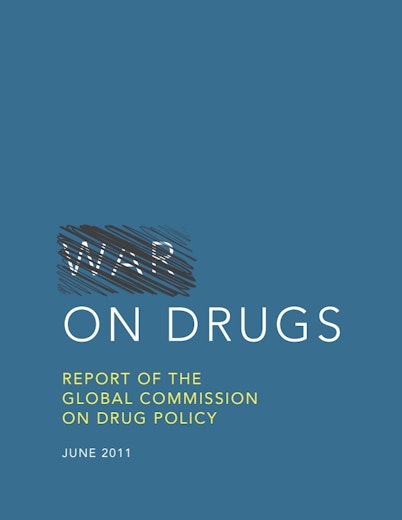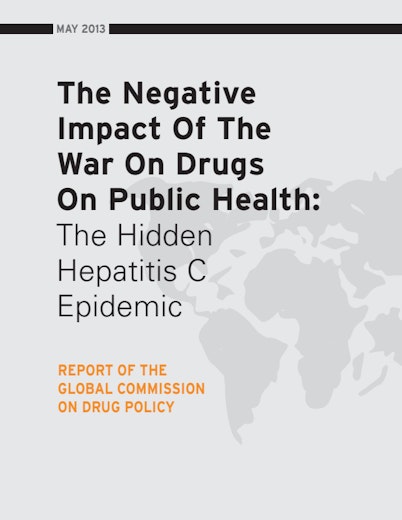A hepatitis C epidemic fuelled by the “war on drugs” is sweeping amongst injecting drug users globally, says a new landmark report released today by the Global Commission on Drug Policy. Of the 16 million people who inject drugs around the world, an estimated 10 million are living with hepatitis C. The report, entitled “The Negative Impact of the War on Drugs on Public Health: The Hidden Hepatitis C Epidemic,” condemns the drug war as a failure and recommends immediate, major reforms of the global drug prohibition regime to halt the spread of hepatitis C infection and other drug war harms.
Throughout the world, research has consistently shown that repressive drug law enforcement practices force drug users away from public health services and into hidden environments where hepatitis C and HIV risk become markedly elevated. Mass incarceration of nonviolent drug users also plays a major role in spreading the pandemic.
“Hepatitis C has to be one of the most grossly miscalculated diseases by governments on the planet,” said Commissioner Michel Kazatchkine, who is also the UN Secretary General’s Special Envoy on HIV/AIDS in Eastern Europe and Central Asia. “It is a disgrace that barely a handful of countries can actually show significant declines in new infections of hepatitis C among people who inject drugs.”
The hepatitis C virus is highly infectious and easily transmitted through blood-to-blood contact. It therefore disproportionately impacts upon people who inject drugs, and is more than three times more prevalent than HIV among this population. In some of the countries with the harshest drug policies, over 90 percent of people who inject drugs are living with hepatitis C, with highest numbers reported in China (1.6 million people), the Russian Federation (1.3 million people), and the USA (1.5 million people).
Globally, most HIV-infected people who inject drugs are also living with a hepatitis C infection. The hepatitis C virus causes debilitating and fatal disease in around a quarter of those who are chronically infected, and is an increasing cause of premature death among people who inject drugs. Harm reduction services—such as the provision of sterile needles and syringes and opioid substitution therapy—can effectively prevent hepatitis C transmission among people who inject drugs, provided they are accessible and delivered early and at the required scale.
“The war on drugs is a war on common sense,” said Commissioner Ruth Dreifuss, who is also the former President of Switzerland. “Repressive drug policies are ineffective, violate basic human rights, generate violence and expose individuals and communities to unnecessary risks. The Hepatitis C epidemic, totally preventable and curable, is yet another proof that the drug policy status quo has failed us all miserably.”
This is the third report published by the Global Commission, the most distinguished group of high-level leaders to ever call for drug policy reform, including alternatives to incarceration, greater emphasis on public health approaches to drug use, decriminalization and experiments in legal regulation of drugs. Released in June 2011, its first report, War on Drugs, generated unprecedented media coverage and catalyzed international debate about the urgent need for a paradigm shift on the global drug prohibition regime. The second report, The War on Drugs and HIV/AIDS, was published in June 2012 in advance of the International AIDS Conference in Washington D.C. and was successful on exposing the links between the HIV pandemic and the criminalization of drug use.
Download
-
The Negative Impact of the War on Drugs on Public Health: The Hidden Hepatitis C Epidemic (4.07 Mb pdf file)
Download the report in English.
Read more
publication
War on Drugs: Report of the Global Commission on Drug Policy

The Global Commission on Drug Policy, an Open Society grantee, released a report condemning the drug war as a failure and recommending major reforms of the global drug prohibition regime.
Voices
Will the United States Lead or Follow on International Drug Reform?
A new U.S. drug czar should put his office’s weight behind international drug policy reform now. Whether he will is an open question.
Voices
Disproportionate Penalties for Drug Offenses in Mexico
A new report reveals that in Mexico’s drug war, those detained and prosecuted for drug-related offenses are mainly consumers and/or small-scale dealers, who often suffer disproportionate penalties.
